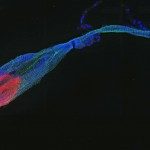Link to Pubmed [PMID] – 17954693
Antimicrob. Agents Chemother. 2008 Jan;52(1):288-98
Implemented as one arm of the malaria control program in French Guiana in the early 1990s, our laboratory has since established in vitro profiles for parasite drug susceptibility to a panel of eight antimalarials for more than 1,000 Plasmodium falciparum isolates from infected patients. The quinine-doxycycline combination was introduced in 1995 as the first-line drug treatment against uncomplicated P. falciparum malaria, replacing chloroquine, and the first-line drug combination was changed to the artemether-lumefantrine combination in 2002. Resistance to chloroquine declined 5 years after it was dropped in 1995 as the first-line drug, but unlike similar situations in Africa, there was a rapid halt to this decline. Doxycycline susceptibility substantially decreased from 2002 to 2005, suggesting parasite selection under quinine-doxycycline drug pressure. Susceptibility to mefloquine decreased from 1997 onward. Throughout the period from 1994 to 2005, most isolates were sensitive in vitro to quinine, amodiaquine, and atovaquone. Susceptibility to amodiaquine was strongly correlated with that to chloroquine and to a lesser extent with that to mefloquine and halofantrine. Susceptibilities to mefloquine and to halofantrine were also strongly correlated. There were two alerts issued for in vitro artemether resistance in the period from 2002 to 2003 and again in 2005, both of which could be associated with the presence of an S769N polymorphism in the sarcoplasmic/endoplasmic reticulum calcium ATPase (SERCA)-type P. falciparum ATPase6 (PfATPase6) gene. Analysis of susceptibility to lumefantrine, conducted for the first time in 2005, indicates an alarming rate of elevated 50% inhibitory concentrations. In vitro monitoring of parasite drug susceptibility should be pursued to further document the consequences of specific drug policies on the local parasite population and, in particular, to establish profiles of susceptibility to individual components of drug combinations to provide early warning signs of emerging parasite resistance.
